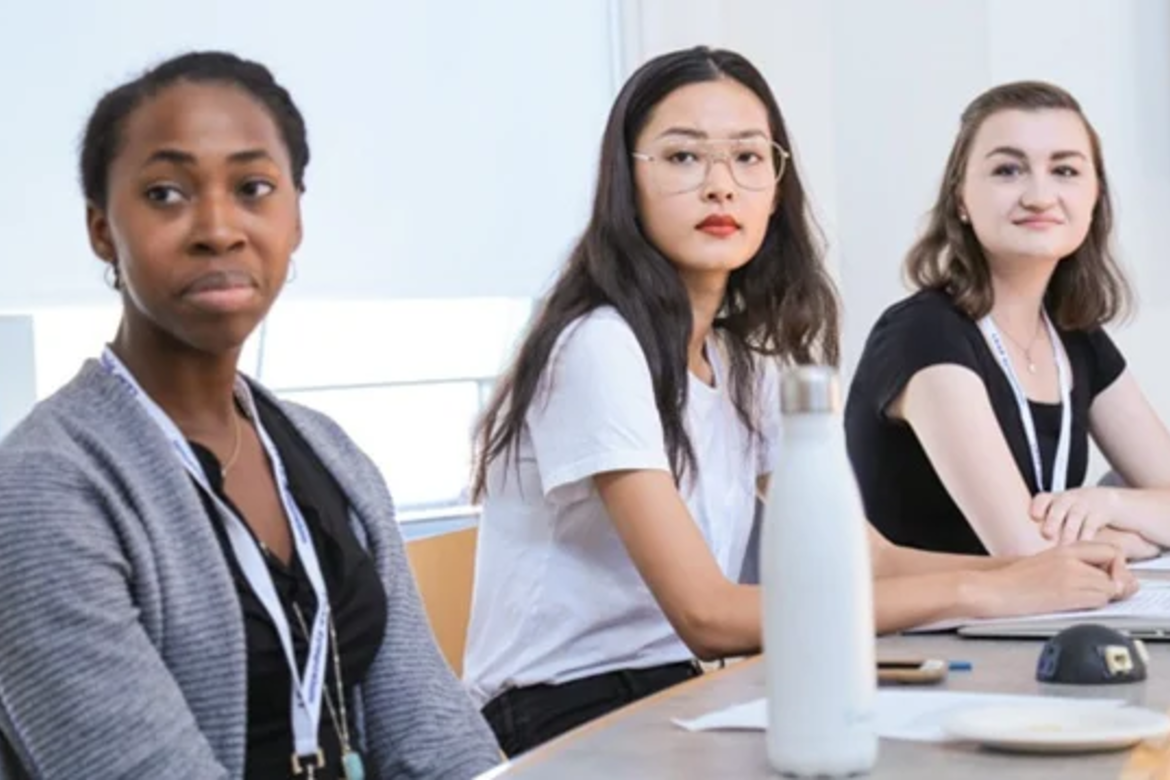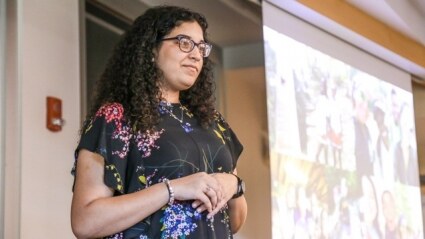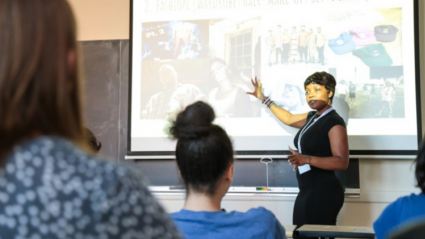Scenes from LEAP 2017

Students — who worked in 42 countries in every imaginable field — rock PowerPoint, field questions and share insight in classrooms and lecture halls packed with family, friends, alumnae, faculty and staff.
The formula for the Learning in Application (LEAP) Symposium remains constant: During a half-day conference, held the Friday of Family and Friends Weekend, panels of students in every major present about their summer internship or research experiences. Students — who worked in 42 countries in every imaginable field — rock PowerPoint, field questions and share insight in classrooms and lecture halls packed with family, friends, alumnae, faculty and staff.
What changes year to year? The stories and reflections. The destinations and growth. The successes and challenges. The surprises and triumphs.
Look before you LEAP
Internships are an integral part of a Mount Holyoke education — 700 to 800 students do internships or research every year. The College makes funding available through the Lynk initiative, overseen by the Career Development Center, so that every student has a chance to do at least one internship, either domestic or abroad. This year, 388 internships were funded, in large part due to the College’s very generous alum, who support their alma mater in countless ways.
Students who receive internship funding are required to give a public presentation, and the LEAP conference is one of the primary opportunities to do that. To prepare for LEAP, students take College 211, which teaches self-reflection on the internship and research experiences and connects them to classwork.
“I enjoy seeing our students from all across the College craft their self-narratives,” said Eleanor Townsley, who as the director of Nexus: Curriculum to Career oversees LEAP and teaches College 211. “They learn a lot from each other — just seeing what others are doing and how they are talking about it. I told them to look around the room at the 300 other people sitting there and take it in and realize they are looking at a certain kind of snapshot of our shared future. It makes me feel more secure about that future, knowing them and listening to their plans.”
LEAP ahead
How do you get an internship? Advice for fellow students by 2017 LEAP participants:
- Go through your inbox and look for programs recommended by the College.
- Apply to more than one program.
- Specificity helps you, so be very specific in your essays and answers.
- Take advantage of the Alumnae Association. One student looked up chemistry majors in New Hampshire, which is how she got her first internship.
- Start early and don’t give up. Even if your search stretches into the spring, keep applying.
- If you get rejected, apply again.
- Don’t limit your search. Keep an open mind.
- Go to the CDC as early as possible.
Reflections
Since it’s not possible to attend each and every panel — 2017 saw the largest number of LEAP presenters ever, at 289 students — the following is a roundup of noteworthy snippets, quotes and reflections.

Lessons of LEAP: the value of a liberal arts education
Eleanor Townsley, who is also the Andrew W. Mellon Professor of Sociology
“Communication and reflection are critical for lifelong learning, global citizenship, social engagement and career and success. These are the College’s learning goals — they are the goals of all liberal arts.”
Anne Demosthene ’18, The Wellness Design: Building a Holistic Foundation
“My internship provided me the opportunity to travel and explore different parts of the world while pursuing both my personal and academic goals.”
Emily Graham ’19, Hydrogen-Bonded Polyaramid Brush Growth on Silica Surfaces
“I found that I really want to go to grad school. The program was made to simulate a graduate school experience. You’re in the lab 9 to 5, working with graduate students. The purpose of our project was to create permanently durable, heat-resistant, self-healing coating with only nanometers-thick surface material.”
Tess Ahlers ’19, How Host Age Affects Susceptibility to Parasitic Infections
“When I started here, I thought I wanted to be an environmental studies major. After three years of biology, I want to be a nurse midwife. The distribution requirements make you go to classes you might never have taken, to see new ideas. This is the advantage of a liberal arts education. You can take a class and realize this is what I want to do.”
Rebecca Mullen ’18, What They Don’t Teach in Journalism Class
“Why a small community publication? For the volume of writing experience, the autonomy, the freedom to play around with the lede and develop angles, to get my foot in the door. And I actually landed a job with the paper. I’m their Saturday reporter [to fervent applause].”
Lillian Williams ’18, From Ball Gowns to Basketball: A Study of Antique Athletic Wear
“Clothing is so personal. It helps the average person to latch on to history. One of the fantastic aspects of this collection is we’re taking a look at what women would have been allowed to wear while they were uncorseted. It helps explain why athletics were immediately so popular on campus. Because you suddenly have this freedom of movement that you would not have in an everyday setting. Corsets are dangerous.”
Katie Berry, Clare Booth Luce Assistant Professor of Biochemistry
“I am teaching a biochemistry class called Mechanisms of Enzyme Inhibition and one of my students, Victoria Yan, is presenting her original research in this session, Common Bonds. She synthesized an enzyme inhibitor and tested it. I encouraged my entire class to come and see her present the same topic I’ve been teaching this fall — many of them are here.”
Victoria Yan ’19, Precision Oncology: Synthesis of a Molecular Targeted Inhibitor for Cancers with 1p36 Homozygous Deletions
“I was not initially assigned to this P.I. — principal investigator. I decided to reach out to this person, I took the initiative and I did this project in two weeks. Using the concepts I learned in Organic Chemistry II, I proposed a simple two-step reaction to the formation of this molecule.This shows that our drug is working! The cell density is decreasing.”
Claire Beckett ’18, Challenges of an Ethical Life: Research in Global Labor Practices and Supply Chains
“I cannot overstate the value of a liberal arts approach to my work.”
Sana Hasan ’18, Journalism In Pakistan: Cultural Reporting from Karachi
“You need to figure things out on your own first. You have to be assertive and ask questions. Be prepared to make a lot of changes to your work, to have entire paragraphs deleted. You must take critique well.”
Eileen O’Grady ’18, Challenging Times: the Small Town Weekly in a 24/7 News World
“The press conference was held at a local craft brewery, which was very Vermont. The beer machines were whirring, so it was really hard for the audio folks. But I did hear the governor’s response to my question.”
Nada Al-Thawr ’19, Impact Beyond Ourselves
“I was able to work directly in my home country, Yemen. I can see myself doing this for the rest of my life.”
Alexandra Singh ’18, Atmospheric Chemistry: Understanding Aerosol Particles and How They Are Affected by Our Changing Environment
“It’s OK not to understand everything that you’re doing. You’re going to have to ask the same questions multiple times.”
Amber Douglas, director of student success initiatives and associate professor of psychology and education
“You’ve made it! Congratulations! You’ve worked really hard to pull this together. You have risked things and shared yourself in ways you maybe weren’t expecting. Your task is to have a good time, to enjoy to be present and to just be here today and reflect upon all of your accomplishments.”

The Mount Holyoke angle
Tess Ahlers ’19, How Host Age Affects Susceptibility to Parasitic Infections
“Presenting is definitely something Mount Holyoke has helped me with. Public speaking stresses me out. I’m being asked to come out of my shell, to be engaged, to be open to being wrong. It’s OK to be uncertain.”
Maryanne Magnier ’18, Senator Elizabeth Warren’s office
“Don’t limit yourself. Use the opportunities Mount Holyoke offers!”
Hoai Thu Dang ’18, A Summer as Development Intern at Frances Perkins Center
“My academics at Mount Holyoke helped me know what I could bring to the internship.”
Trang Thu Hoang ’18, Human Library Vietnam: Eradicating Social Prejudices through Open Dialogues
“Mount Holyoke prepared me for this internship through its diversity and inclusivity initiatives. My classes and group activities cultivated my leadership skills, which I used during my internship.”
Sofia Elisa Rivera ’18, Superhuman Service and the People Behind Them
“As a Mount Holyoke woman, I stepped up to the plate and got things done. This internship made me appreciate what Mount Holyoke has given me — it helps you realize that you are a leader to be respected.”
Yuan Tian ’19, Effect of Oxygen Vacancy on Proton Binding Site Energies of 12.5% Y-doped BaZrO3
“Why you should join our lab? It’s a great combination of math, physics, chemistry and computer science. If you’re interested in all of them and don’t want to choose just one, this might be a great option for you.”
Kelly Bentdahl ’19, “I’m an Educator Not a Litigator:” Balancing Enforcement and Teaching in Anti-Discrimination Law
“The independence and individual responsibilities I had as an undergrad allowed me to gain legal analysis and writing skills that will equip me for law school.”
Maddy Skrak ’18, Finding my Niche at The Chronicle
“MoHos are everywhere. I had three MHC alumnae in my small office in Virginia, in the middle of horse country.”
Emily Tarantini ’18, When Time Takes Up Space: Collections Management in a Museum
“My favorite thing about Mount Holyoke is how the Art Museum incorporates not only history and anthropology and art history courses into its program, but also astronomy classes, math classes, all kinds of science classes. You can really make a living doing this and it’s not just some kind of fantasy. There are real meaningful careers you can have.”